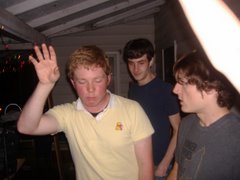Beginning
I don't really know how to begin. So, I'll just start off with some words.
- begin

- O.E. beginnan, also onginnan (class III strong verb; past tense ongann, pp. ongunnen), from bi- "be" + W.Gmc. *ginnan, of obscure meaning, found only in compounds, perhaps "to open, open up" (cf. O.H.G. in-ginnan "to cut open, open up," also "begin, undertake"). Meaning "beginner, novice" is from 1470.
- start (v.)

- O.E. *steortian, *stiertan, Kentish variants of styrtan "to leap up" (related to starian "to stare"), from P.Gmc. *sturtjan- (cf. O.Fris. stirta "to fall, tumble," M.Du. sterten, Du. storten "to rush, fall," O.H.G. sturzen, Ger. stürzen "to hurl, throw, plunge"), of unknown origin. From "move or spring suddenly," sense evolved by c.1386 to "awaken suddenly, flinch or recoil in alarm," and 1666 to "cause to begin acting or operating." Meaning "begin to move, leave, depart" is from 1821. The connection is probably from sporting senses ("to force an animal from its lair," c.1384). To start something "cause trouble" is 1917, Amer.Eng. colloquial. For starters "to begin with" is 1873, Amer.Eng. colloquial. Starter home is from 1976; starter set is from 1946, originally of china. Starting block first recorded 1937.
- commence

- 1314, from O.Fr. comencier, from V.L. *cominitiare, orig. "to initiate as priest, consecrate," from L. com- "together" + initiare "to initiate." The academic sense of commencement "action of taking a full degree," is in M.E.
- initiation

- 1583, from L. initiationem (nom. initiatio) "participation in secret rites," from initiatus, pp. of initiare "originate, initiate," from initium (see initial). Initiate (v.) is 1603, from L. initiatus, pp. of initiare. The noun meaning "one who has been initiated" is first recorded 1811.

No comments:
Post a Comment